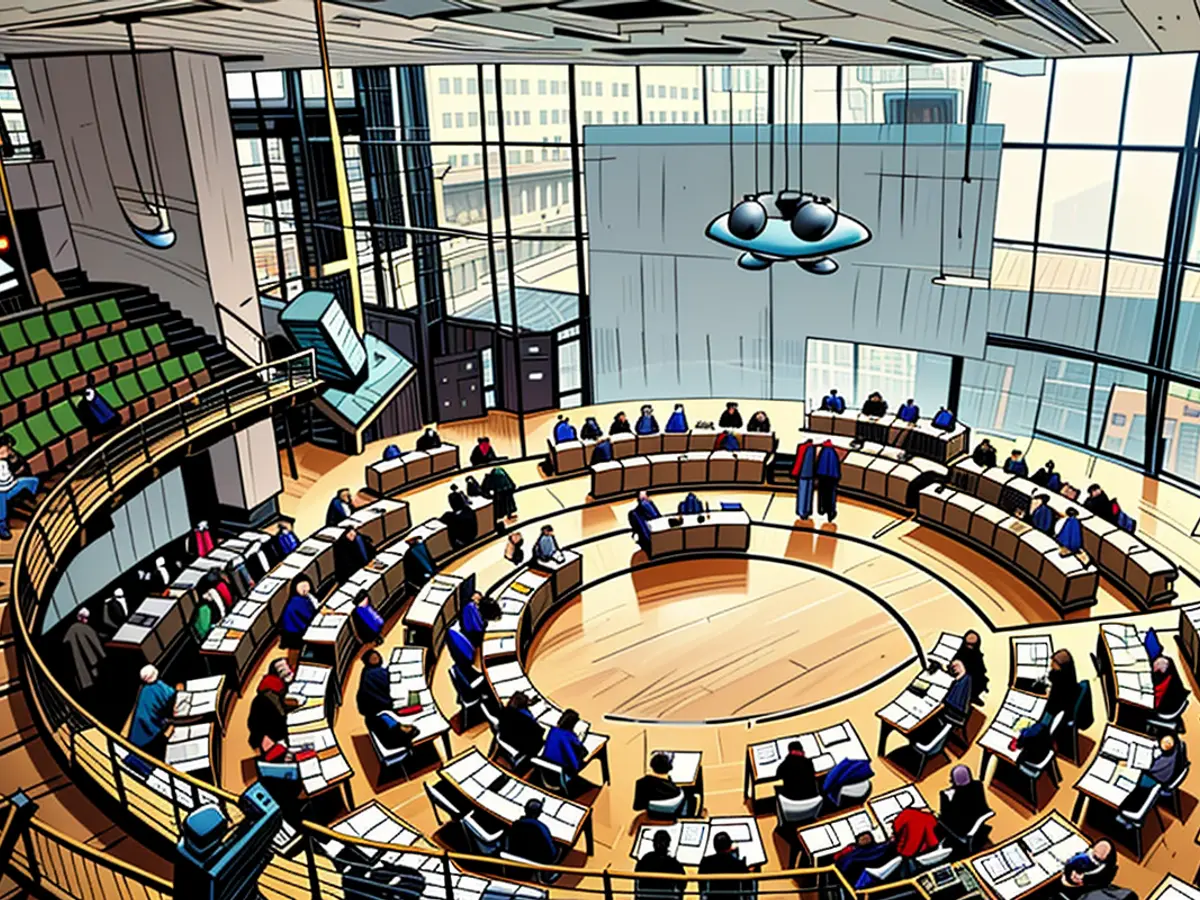- Post-Election Analysis in Saxony: Examination and Subsequent Actions
After the local election, the hunt for a viable governing coalition for the upcoming five years in Saxony commences. In the morning, the regional chairpersons and key executives from the political parties will deliberate on the election outcomes in Dresden. Prominent figures will also offer their perspectives on the result in Berlin. Certain parties have scheduled their initial board meetings for the evening.
As per the preliminary results, the CDU has regained its stronghold with 31.9% of the votes. The AfD, identified as a firmly right-wing extremist entity by the Saxon Office for the Protection of the Constitution, secured the second position with 30.6%. The Sahra Wagenknecht Alliance (BSW), managing to establish itself from scratch, garnered 11.8% of the votes and is likely to influence future coalition arrangements. The SPD obtained 7.3% while the Greens marked 5.1%. The Left was able to penetrate the state parliament with 4.5% due to scoring two direct mandates in Leipzig. This admits them into the parliament according to a clause, even though they fell short of the five percent threshold. The voter turnout stood at 74.4%.
The AfD will secure 41 seats in the state parliament (38), the CDU 42 mandates (45). The BSW will possess 15 members. The SPD will garner 9 seats (10), the Greens 6 seats (12), and The Left 14. The Independent Voters, who bagged 2.3%, will be represented in parliament with one member through a direct mandate. The former coalition of CDU, Greens, and SPD no longer possesses a majority.
Kretschmer: Forming a new coalition won't be simple
"This won't be simple", asserted the incumbent Saxony Minister President Michael Kretschmer of the CDU on Sunday regarding the quest for a new coalition. "However, one factor is undeniable: with numerous talks and the will to do something for this region, it is possible to instate a stable government for Saxony that serves the region and proceeds with humility."
The Saxon AfD top candidate Jörg Urban declared his intention to exert pressure on a potential future state government as the opposition party. "We will continue to drive this government in front of us."*
BSW an unwilling 'stirrup holder' for the Minister President
The Sahra Wagenknecht Alliance (BSW) deemed the result 'historic', making it clear that they do not wish to be an 'unwilling stirrup holder' for the incumbent Minister President. "With us, there will only be a fresh start. We will not act as majority makers", stated party chairwoman Sabine Zimmermann regarding possible coalition negotiations.*
SPD head Homann described his party's outcome as successful. The SPD had previously faced the danger of losing their re-election to the state parliament in the polls. "We have always said, we are about Saxony", he emphasized. The Saxon SPD aims to focus on the Free State and not get swept away in broader political discussions about federal or global issues.
According to the Greens' chairperson Christin Furtenbacher, the election result is not what the people of Saxony deserve. Various political forces attempted to suppress the Greens at every opportunity, expressed faction leader Franziska Schubert. "What did we do? We stayed on top."*
Left leader calls for a thorough reevaluation of his party
Above all, the Left faces a rigorous evaluation of its performance. Without the obtained direct mandates, they would have vanished from the state parliament - a first in an eastern German state parliament since the turnaround.
State leader Stefan Hartmann called for a fundamental reevaluation of the party. With their entry into the parliament via the basic mandate clause, the Left impeded the continuation of the existing coalition of CDU, Greens, and SPD - unless the coalition is endorsed by the Left.*
Leipzig political scientist Hendrik Träger considered a minority government of CDU and SPD, sustained by the BSW, as a potential option on election night. "Such governmental formats are common in Scandinavian countries. Therefore, it is advisable to look beyond the German horizon."
Political scientist Johannes Kiess expected an extremely challenging coalition formation in Saxony and Thuringia. The "anti-traffic light" campaign of the CDU also contributed to this. Furthermore, there exists a novel, murky variable in the game with the BSW. "Even if the BSW opts for a constructive role, its longevity in the next year, prior to the federal election, is questionable," Kiess informed the German Press Agency.
Scientist: No positive news for political culture
The scientist opined: "The AfD and also the BSW have the potential to capitalize on the current societal climate, whereas the milieus of SPD and Greens appear to be demobilized. The CDU is by no means in a position to establish a coalition with but a single partner. This is not favorable news for political culture in Germany."
Given the current coalition dynamics in Saxony, the SPD might find it challenging to secure a significant role in the upcoming five-year government. Despite obtaining 7.3% of the votes, they may struggle to negotiate favorable terms due to the strong performances of the CDU, AfD, and BSW.
In light of the AfD's firm stance as the opposition party, they are likely to exert pressure on any potential future state government, further complicating coalition negotiations for the SPD.








